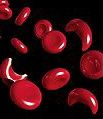Cochrane: Sickle cell disease is an inherited blood condition caused by defects in the production of haemoglobin. Haemoglobin
is the part of the red blood cell that carries oxygen across the body.
Sickle cell disease occurs when people inherit faulty genes responsible
for producing haemoglobin
from both parents. A variety of complications and a reduced life
expectancy are linked with sickle cell disease. Phytomedicines are
medicines derived from plants in their original state. People with
sickle cell disease may come across them in terms of plant-remedies from
traditional healers. Their benefits have not been evaluated
systematically. Laboratory work has long suggested that these medicines
may help to ease the symptoms of sickle cell disease.
This review includes two trials. Each trial looked at a different phytomedicine. This review found that Niprisan® (also known as Nicosan®), may help to reduce episodes of sickle cell disease crisis associated with severe pain. Ciklavit®, which has been reported to reduce painful crises in people with sickle cell disease, deserves further study before recommendations can be made regarding its use. The trial of Ciklavit® also reported a possible adverse effect on the level of anaemia. More detailed and larger trials of these medicines will need to be carried out before we can make any recommendations about their use. Further research should also assess long-term outcome measures.
This review includes two trials. Each trial looked at a different phytomedicine. This review found that Niprisan® (also known as Nicosan®), may help to reduce episodes of sickle cell disease crisis associated with severe pain. Ciklavit®, which has been reported to reduce painful crises in people with sickle cell disease, deserves further study before recommendations can be made regarding its use. The trial of Ciklavit® also reported a possible adverse effect on the level of anaemia. More detailed and larger trials of these medicines will need to be carried out before we can make any recommendations about their use. Further research should also assess long-term outcome measures.
Authors' conclusions:
While Niprisan®
appeared to be safe and effective in reducing severe painful crises
over a six-month follow-up period, further trials are required to assess
its role in the management of people with sickle cell disease and the
results of its multicentre trials are awaited. Currently no conclusions
can be made regarding the efficacy of Ciklavit®. Based on the published results for Niprisan® and in view of the limitations in data collection and analysis of both trials, phytomedicines may have a
potential beneficial effect in reducing painful crises in sickle cell
disease. This needs to be further validated in future trials. More
trials are required on the safety and efficacy of phytomedicines used in managing sickle cell disease.
